Blockchain for telecommunications means using unique technology to make telecom networks safer and more efficient. It helps manage data and transactions better, making systems more reliable and trustworthy.
Blockchain offers great benefits to telecom. It boosts security by protecting data from online threats, makes transactions faster and cheaper by cutting out middlemen, and ensures everything is transparent and accountable across the network.
Choosing blockchain in telecom is a big deal. It makes networks more secure and clear, brings in new ideas, and improves how customers experience services.
However, to upgrade your telecom game with top-notch blockchain solutions, check out Webisoft‘s services. Let’s build a safer and smarter future for your telecom needs.
Contents
- 1 What Does Blockchain Mean for Telecommunications?
- 2 Advantages of Blockchain in Telecommunications
- 3 How Blockchain Technology Empowers Telecom Network Operation?
- 4 Use Cases for Blockchain for Telecommunications
- 5 Challenges of Blockchain in Telecommunications
- 6 Successful Blockchain Projects Examples in Telecommunications
- 7 What Will be the Future of Blockchain in Telecommunications?
- 8 What Blockchain-Based Telecommunication Support Webisoft Offers?
- 9 Final Note
- 10 Frequently Asked Questions
What Does Blockchain Mean for Telecommunications?
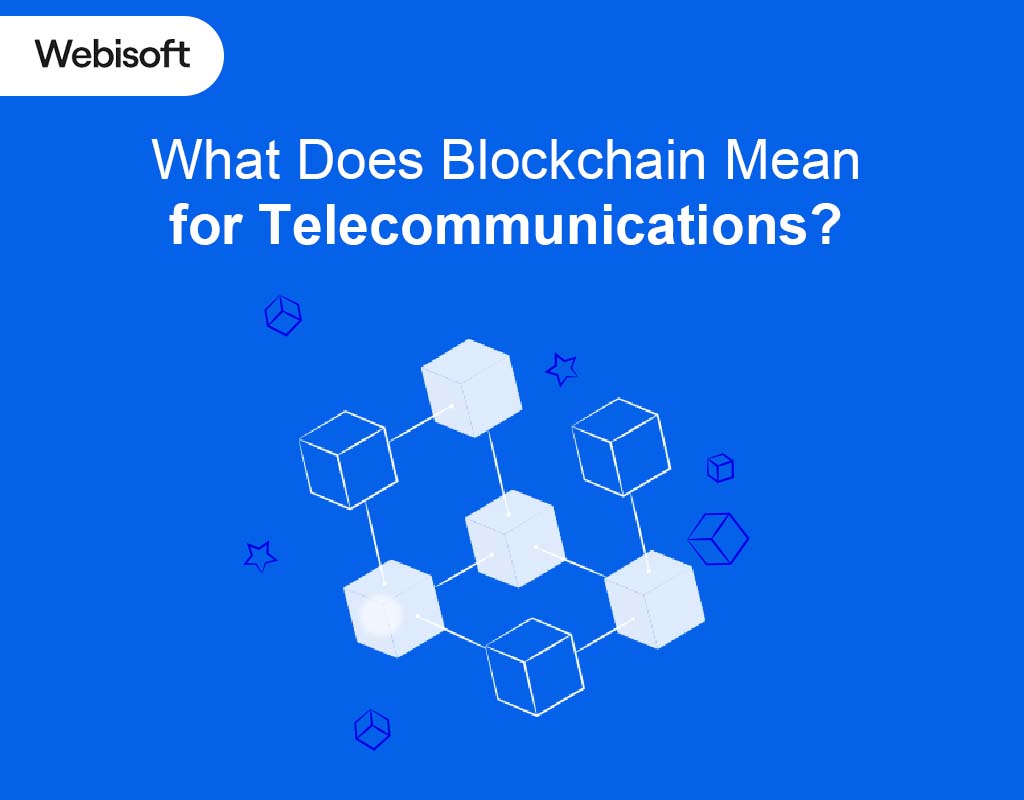
Blockchain in telecommunications refers to integrating blockchain technology within the telecom industry. This integration aims to enhance various aspects of telecommunication services using blockchain’s decentralized and secure features.
However, blockchain for telecommunications involves utilizing blockchain’s distributed ledger technology to optimize processes, transactions, and security measures within the telecom sector. It introduces a transparent, tamper-proof way of recording and managing data and transactions across telecommunication networks.
Advantages of Blockchain in Telecommunications
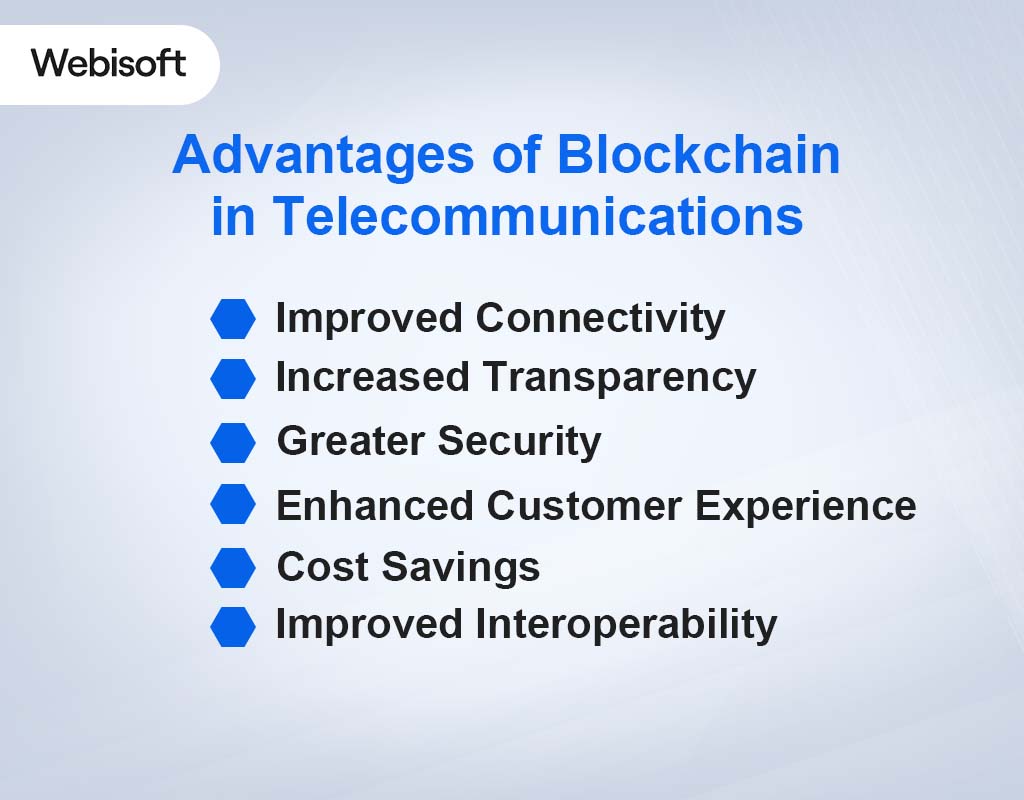
The integration of blockchain in telecommunications brings many advantages. Its impact is far-reaching, from bolstering connectivity and transparency to enhancing security and customer experiences.
The cost-effective nature and improved interoperability further solidify its role in revolutionizing the telecom industry. Implementing blockchain technology opens doors to a more efficient, secure, and interconnected future in telecommunications.
Here are the core benefits of blockchain in telecommunication.
Improved Connectivity
Blockchain in telecommunications offers enhanced connectivity by creating a decentralized network. You benefit from smoother communication channels, ensuring seamless interactions. With blockchain’s distributed ledger system, information transmission becomes more efficient.
Increased Transparency
Blockchain technology in telecom provides heightened transparency within operations. You get a clear view of transaction histories and data exchanges. Through its immutable ledger, every transaction becomes traceable and verifiable.
Greater Security
Blockchain for the telecom industry reinforces security measures across the network. It employs advanced cryptographic techniques to safeguard data integrity. With its decentralized nature, blockchain diminishes vulnerabilities associated with centralized systems.
Enhanced Customer Experience
Blockchain platforms in telecommunications revolutionize customer experiences by optimizing services. You can enjoy improved service quality and personalized offerings. Through efficient data management, telecom providers modify solutions to your specific needs.
Cost Savings
Blockchain in telecom enables significant cost savings through restructured processes. By eliminating intermediaries, transactions become more efficient and cost-effective. Smart contracts automate tasks, reducing manual intervention and associated expenses.
Improved Interoperability
Blockchain technology fosters improved interoperability among telecom systems and devices. It facilitates seamless integration between different networks and platforms. This interoperability enhances communication and data exchange between various stakeholders.
How Blockchain Technology Empowers Telecom Network Operation?
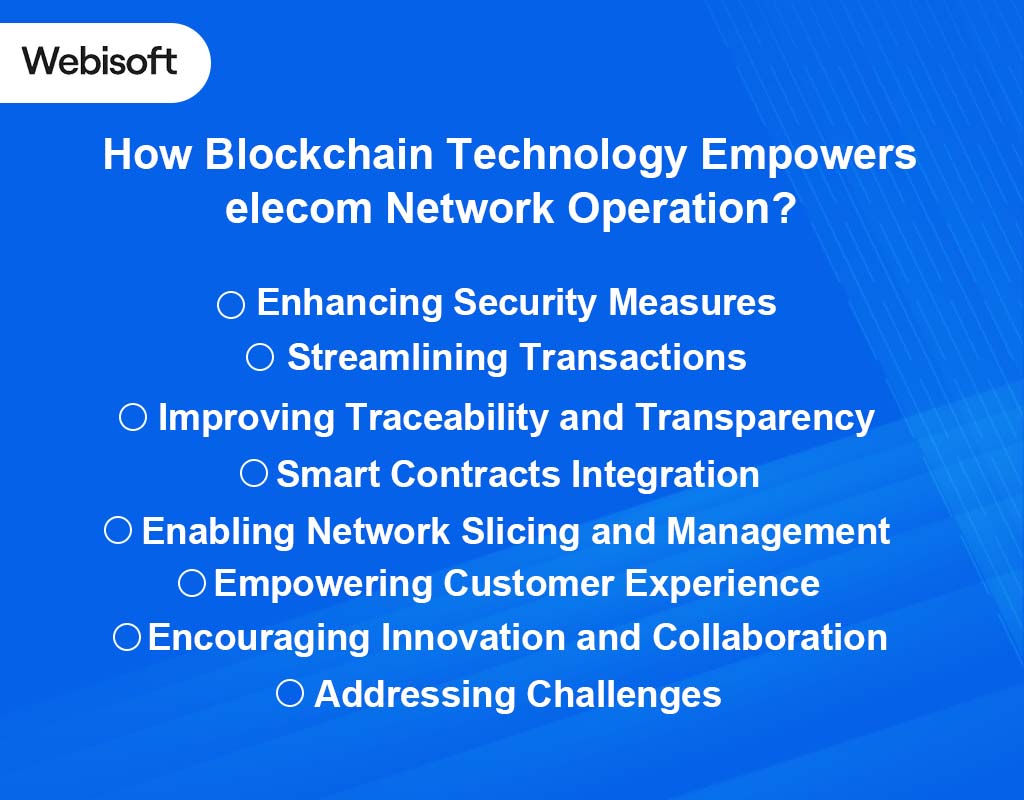
Blockchain technology is a game-changer in the telecom industry. Its integration introduces unparalleled security, transparency, and efficiency, revolutionizing network operations.
However, accepting blockchain in telecom is not merely an option but a requirement in the digital era. Its transformative potential is reshaping the industry, promising a future of enhanced connectivity and seamless operations.
Enhancing Security Measures
In telecom, security is paramount. Blockchain technology ensures robust security, safeguarding sensitive data from cyber threats. Through its decentralized structure, blockchain offers an immutable ledger, minimizing the risk of data breaches.
Streamlining Transactions
Blockchain simplifies and accelerates transactions within the telecom network. Eliminating intermediaries fosters quicker and more efficient processes, reducing delays and operational costs.
Improving Traceability and Transparency
With blockchain for the telecom industry, transparency and traceability reach new heights. You gain a clear view of transactions and activities, enhancing accountability across the network.
Smart Contracts Integration
Integrating smart contracts into telecom operations via blockchain updates contract execution. These self-executing contracts automate tasks when predefined conditions are met, reducing manual intervention and ensuring agreement adherence.
Enabling Network Slicing and Management
Blockchain platforms in telecommunications facilitate network slicing—a revolutionary concept allowing the creation of multiple virtual networks on a single physical infrastructure. This enhances network management and customization based on diverse user needs.
Empowering Customer Experience
Through blockchain in telecom, customer experiences are enriched. Transactions become more seamless, empowering users with increased control and transparency over their data and services.
Encouraging Innovation and Collaboration
Blockchain technology fosters innovation and collaboration within the telecom sector. It encourages the development of new solutions and partnerships, driving the industry toward greater advancements.
Addressing Challenges
While blockchain brings numerous benefits, challenges exist. Scalability and interoperability concerns need addressing to ensure seamless integration and widespread adoption across the telecom network.
Use Cases for Blockchain for Telecommunications
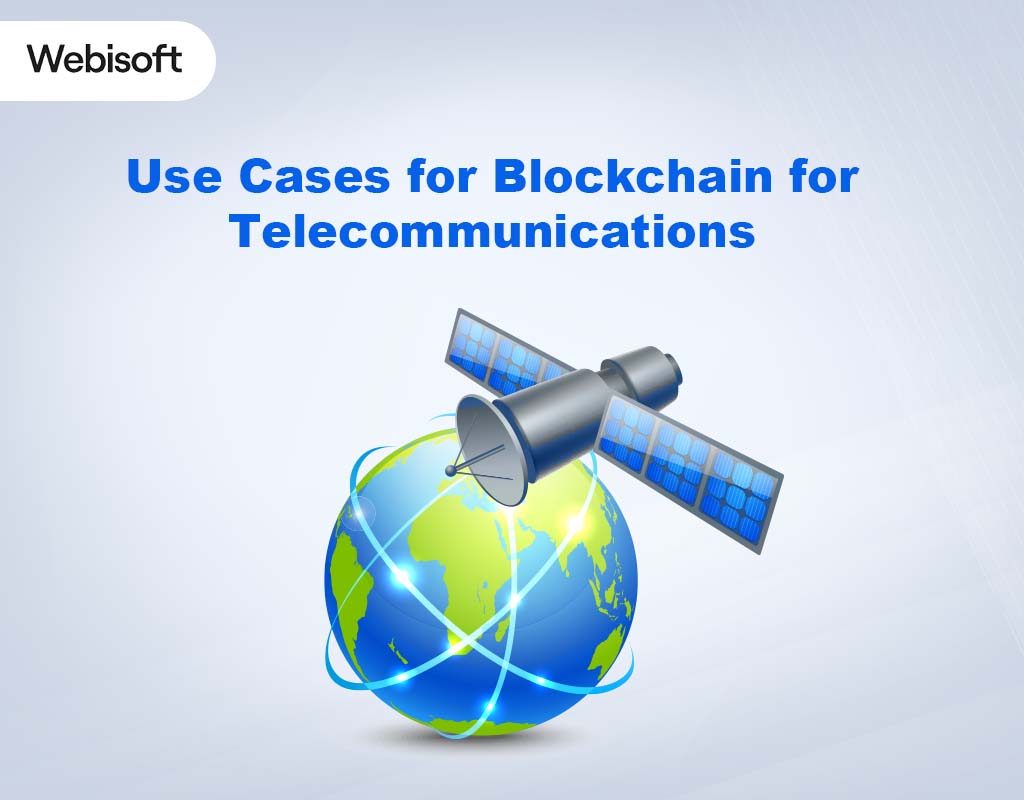
Blockchain in telecommunications encompasses various applications that revolutionize the industry, promising enhanced efficiency, security, and transparency. You get from decentralized networks, secure transactions, and modernized management systems.
However, the technology facilitates trust and reliability within telecom operations, ensuring a seamless experience across various aspects of communication and connectivity. Whether securing digital identities or managing supply chains, blockchain’s integration reshapes telecom into a more efficient, secure, and interconnected ecosystem.
Decentralized Networks
Telecom, through blockchain, creates decentralized networks, reducing reliance on central authorities for operations. You benefit from a more resilient, transparent network structure, enhancing reliability and trust in communication.
Mobile Payment Solutions
Blockchain for telecommunications revolutionizes mobile payment solutions, enabling secure and efficient transactions. Your mobile transactions become faster, more transparent, and resistant to fraud or manipulation.
Secure Digital Identity Management
Blockchain technology in telecom assures robust digital identity management. Your identity remains secure, minimizing identity theft or other unauthorized access risk.
Content Distribution
With blockchain for the telecom industry, content distribution becomes more efficient and transparent. You can securely share and access content, ensuring authenticity and copyright protection.
IoT Connectivity
Blockchain for telecommunications empowers IoT connectivity in telecom, enhancing the reliability and security of interconnected devices. You experience seamless, trustworthy communication among your IoT devices.
Smart Contracts
Through blockchain platforms in telecommunications, smart contracts automate and secure agreements. You reorganize contract execution, ensuring transparency and reducing transactional disputes.
Supply Chain Management
Blockchain in telecom facilitates transparent supply chain management. It enhances traceability, enabling you to track products’ journeys, ensuring authenticity, and reducing fraud possibilities.
Network Security
Blockchain technology fortifies network security in telecom. Its decentralized nature mitigates vulnerabilities, safeguarding against cyber threats and unauthorized access.
Roaming Management
Blockchain simplifies roaming management in telecom. You experience modernized processes, reduced costs, and increased transparency in roaming transactions.
Challenges of Blockchain in Telecommunications
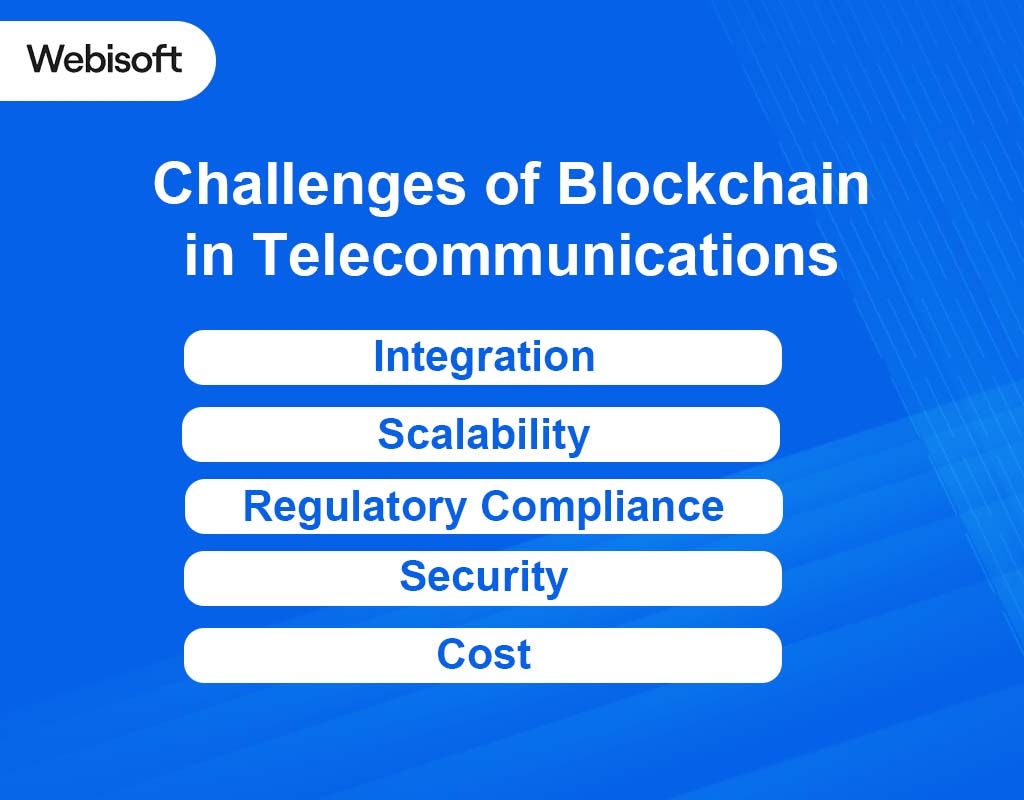
Blockchain for telecommunications encounters challenges that necessitate careful consideration and strategic planning. Overcoming integration hurdles, ensuring scalability, complying with regulations, fortifying security, and managing costs are pivotal for successful implementation.
However, addressing these challenges systematically will pave the way for blockchain’s transformative potential in revolutionizing the telecom industry.
Integration
Integrating blockchain for telecommunications poses challenges due to its complex nature. You’ll need expertise and resources for seamless integration into existing systems. Ensuring compatibility between blockchain and current telecom infrastructure demands careful planning and execution.
Scalability
Scalability remains a significant challenge when implementing blockchain in telecom. As network demands grow, ensuring blockchain can handle increased transactions and data becomes crucial. You’ll need scalable solutions that accommodate the expanding network without compromising efficiency.
Regulatory Compliance
Meeting regulatory requirements pose a challenge for blockchain in telecom. Adhering to evolving legal frameworks while maintaining blockchain’s decentralized nature can be intricate. You must go through complex compliance standards across different regions, ensuring data privacy and security measures align with regulatory mandates.
Security
Although the blockchain platform is renowned for its security, challenges persist within the telecom sector. Safeguarding against sophisticated cyber threats requires constant vigilance and innovation. You’ll need robust encryption methods and consensus mechanisms to protect sensitive data.
Cost
Implementing blockchain in telecommunications can incur substantial costs. Developing and maintaining blockchain networks demands significant technological, expertise, and infrastructure investments. Upgrading existing systems and training personnel adds to the expenses.
Successful Blockchain Projects Examples in Telecommunications
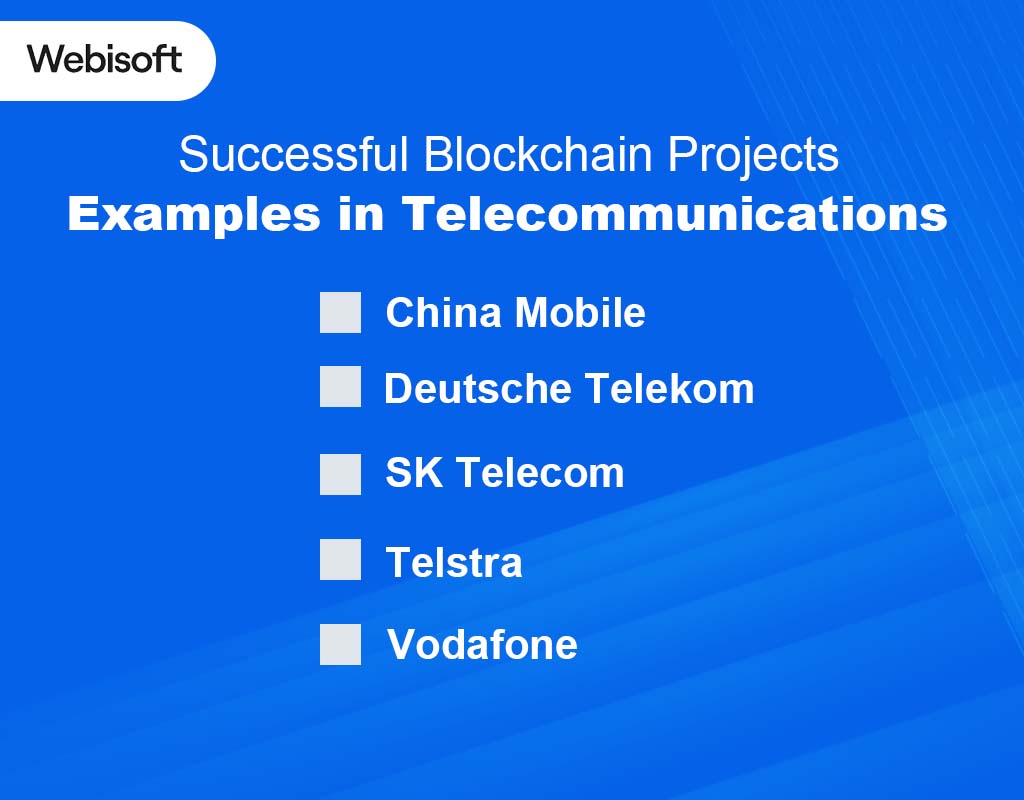
In telecommunications, these successful blockchain projects showcase the industry’s evolution. By adopting blockchain technology, companies like China Mobile, Deutsche Telekom, SK Telecom, Telstra, and Vodafone prioritize your security, transparency, and overall satisfaction.
Their utilization of blockchain in telecom underlines a commitment to innovative, secure, and customer-centric telecom solutions that shape the industry’s future.
China Mobile
China Mobile has integrated blockchain into telecommunications, enhancing its operational efficiency. Users benefit from improved security and transparency in their services.
Customer’s data is secure through blockchain technology, and transactions are more transparent. This ensures trust and reliability in their telecom operations. China Mobile’s adoption of blockchain illustrates its commitment to innovative and secure telecom solutions.
Deutsche Telekom
Deutsche Telekom uses blockchain technology in telecom for enhanced security measures. Users experience heightened data protection and confidentiality in their services. Implementing blockchain ensures secure data transmission and storage for customers like you.
SK Telecom
SK Telecom integrates blockchain in telecom, optimizing customer experiences and service quality. The customers can enjoy personalized solutions and faster transactions through this technology. With blockchain, they rationalize their operations to efficiently cater to your specific needs.
Telstra
Telstra uses blockchain technology in telecom to modernize processes and improve efficiency. User’s transactions become more seamless and cost-effective with this integration. Through blockchain adoption, they reduce intermediaries and administrative costs, benefiting you directly.
Vodafone
Vodafone employs blockchain in telecommunications, emphasizing transparency and accountability in their services. User’s data exchanges become more transparent and verifiable through this technology. With blockchain, they ensure a clear and traceable record of transactions, fostering trust.
What Will be the Future of Blockchain in Telecommunications?
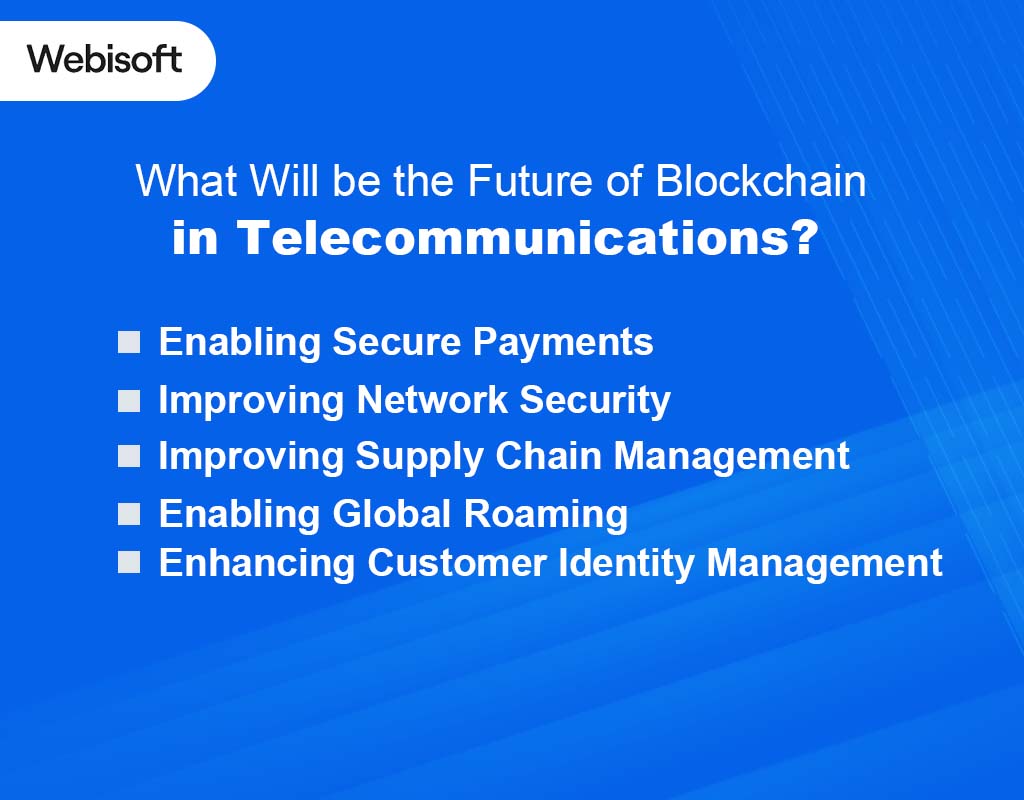
The future of blockchain in telecommunications is promising, offering transformative solutions to various industry challenges. Blockchain technology will enable secure and efficient payment systems. Moreover, it will ensure faster and tamper-proof transactions.
As blockchain continues to evolve and integrate further into the telecom sector, you can expect heightened efficiency, security, and transparency. Its transformative potential will shape the future of telecommunications. Moreover, it will promise a more interconnected, secure, and customer-centric industry landscape.
Enabling Secure Payments
Blockchain development in telecommunications will ensure secure payments by eliminating intermediaries. You’ll experience faster, tamper-proof transactions, bolstering trust and reducing fraud risks. Implementing blockchain technology will enhance payment security, streamlining financial processes within the telecom industry.
Improving Network Security
Blockchain fortifies network security in telecom. It will offer strong protection against cyber threats. You will benefit from a decentralized network architecture, minimizing vulnerabilities and ensuring data integrity. Your network will become more resilient, safeguarding against unauthorized access and potential breaches.
Improving Supply Chain Management
Blockchain technology in telecom will transform supply chain management. It will enhance transparency and traceability. Moreover, you’ll track product journeys seamlessly, reducing fraud possibilities and ensuring authentic transactions. Integration of blockchain will simplify supply chain operations, optimizing efficiency and reliability.
Enabling Global Roaming
With blockchain in telecommunications, global roaming will become easier and transparent. You will experience enhanced connectivity across diverse networks. Moreover, it will reduce complexities and costs associated with roaming. Blockchain will surely facilitate smoother transactions, ensuring better service availability worldwide.
Enhancing Customer Identity Management
Blockchain empowers strong customer identity management in telecom. Your personal data will remain secure and easily verifiable, minimizing identity theft risk. You will gain control over your identity information, ensuring enhanced privacy and trust in telecom services.
What Blockchain-Based Telecommunication Support Webisoft Offers?
Webisoft provides comprehensive support for blockchain-based telecommunications, ensuring a seamless and secure integration process.
With a focus on enhancing security, and ensuring efficient integration, Webisoft enables telecom companies to connect the transformative power of blockchain technology.
Blockchain Integration Solutions
Webisoft offers tailored blockchain integration solutions for the telecommunications sector. You gain expertise in seamlessly integrating blockchain technology into your existing telecom systems. This integration ensures enhanced security, transparency, and efficiency across your network.
Security Enhancement Services
With Webisoft’s services, you secure your telecom network through robust blockchain-based security measures. You access cutting-edge encryption methods and decentralized architectures, safeguarding your data against cyber threats.
Customized Blockchain Solutions
Webisoft tailors blockchain solutions to meet your specific telecom needs. You’ll receive personalized services aligned with your operational requirements. Whether it’s optimizing transactions, improving traceability, or enhancing customer experiences, Webisoft crafts bespoke blockchain solutions for your telecom endeavors.
Final Note
Blockchain is changing how telecom works, offering better security, efficiency, and trust. Using blockchain gives telecom stronger security, faster transactions, and happier customers.
As the need for secure communication grows, picking blockchain for telecom is crucial. It means committing to a safer, faster, and more customer-focused telecom world.
Now, level up your telecom game with Webisoft‘s custom-made blockchain solutions. Let’s lead the way to a smarter telecom future together.
Frequently Asked Questions
Can blockchain improve network security in telecom?
Yes, blockchain strengthens network security by creating a tamper-proof record of transactions and activities across telecom networks.
What role does Webisoft play in Blockchain for Telecom?
Webisoft develops innovative solutions integrating blockchain into telecom systems, enhancing efficiency and security.
Is blockchain only for big telecom companies?
No, blockchain benefits large and small telecom companies by providing secure, decentralized solutions adaptable to various scales.
How does blockchain enhance data privacy in telecom?
Blockchain encrypts data and enables users to control their information. It enhances privacy and minimizes the unauthorized access risk.
Can blockchain improve billing and payments in telecom?
Blockchain modernizes billing processes, ensuring transparent, accurate, and timely payments within the telecom sector.

